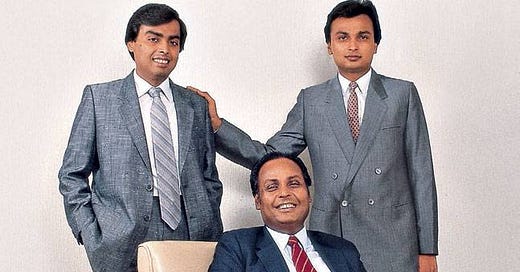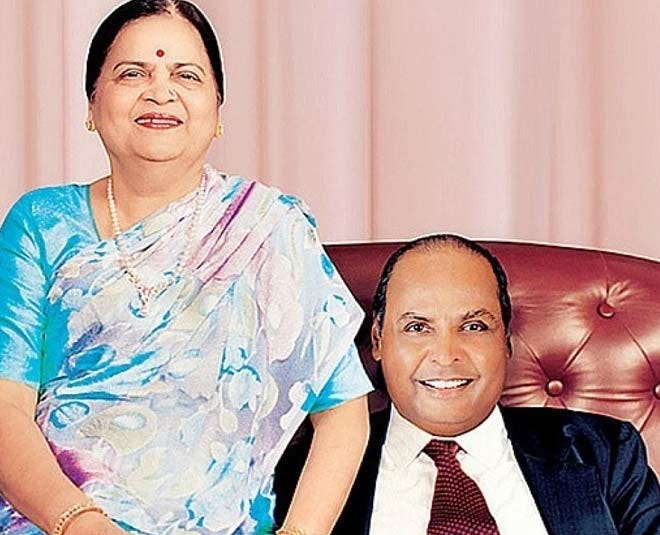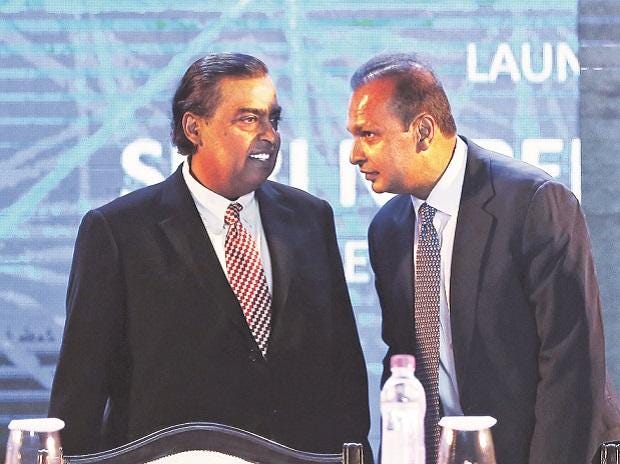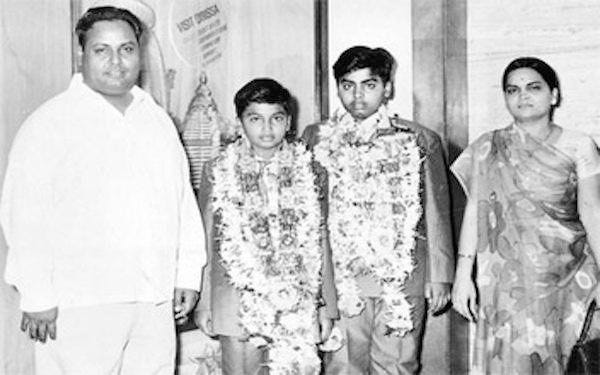A Piece Of Paper That Made Ambani Brothers Fight: #Issue: 4 🗞️
The story of India's biggest family dispute and the role of an agreement
Hey there 👋
Some updates from the team. We hit 100 subscribers and continue to grow. Thank you so much for your love and support. We look forward to continued support from our readers!
When Dhirubhai died, the man did not leave behind a will. There was no succession plan at Reliance. A temporary arrangement was done to keep things running. A few years down the line, Reliance found itself in a war between the brothers. In today’s ‘Story’, we have “the Biggest Family Dispute in India”.
Before we dive deep, Would you mind sharing this story with your friends and family?
Dhirubhai passed away in 2002 without leaving behind a will and succession plan. The bigger than life figure died unexpectedly. His death left a vacuum in Indian business circuits and the business empire he headed, Reliance. With no succession plan, the Ambani family followed the traditional Hindu family customs.
The Succession Plan:
The Reliance Business Empire came up with a plan to settle things for the time being. Elder brother Mukesh Ambani was appointed as the Chairman of Reliance industries, and Anil Ambani was accommodated as the Vice-Chairman. For many, it seemed a temporary arrangement.
People close to Reliance knew Mukesh Ambani has always been a man working on the ground while younger brother Anil Ambani was the man looking after the group’s finance and likes to keep in touch with top shots in the government and business world. There was something in the arrange at Reliance that was not feeling right.
First Sign Of Troubles:
In just 2 years after Dhirubhai’s death, the Ambani business family found itself in the middle of a civil war. Mukesh Ambani used his power to pass a resolution that made the post of Vice Chairman of the company a placeholder. Anil Ambani was placed under the overall authority of Mukesh Ambani.
In return, Anil Ambani refused to sign the annual financial report of Reliance and questioned the lack of transparency. Directors of a subsidiary company controlled by Anil Ambani resigned in protest.
This was followed by series of acquisitions and counter acquisitions. India’s biggest business was on a vertical split. Both the Ambani brothers held their guns against each other while they live in the same house called ‘Sea Castle’.
The civil war got so dirty that the Finance Minister of India had to step in and request the Ambani brothers to solve the dispute.
Kokilaben Stepped In:
For their mother Kokilaben, the civil war was a bit too much to stay out of. She did not want the name and legacy of Dhirubhai to become a topic of debate n every sphere of India.
In 2005, Kokilaben, the Mother of the Ambani brothers took things into her hands. She decided to divide the company. The charge of this complex affair was given to Dhirubhai’s personal banker K. V. Kamath of ICICI Bank and Nimesh Kampani of JM Financials.
Even for experienced bankers like Kamath and Kampani, this was a herculean task. They had to divide an empire, an empire built by probably the greatest Indian entrepreneur of the 20th century. While the bankers negotiated with both parties, India held its breath.
Mukesh Ambani was given the old and slow-growing Oil and Petrochemical businesses while Anil Ambani was given the new and fast-growing telecom, power and financial services businesses.
As India’s biggest company was divided, everyone thought the battle was over and things would come back to normal. There were smiles and a sigh of relief, but for how long?
The Era Of Two Reliance:
In 2007, Anil Ambani tripled his net worth to $45 billion and became the 3rd richest Indian. Mukesh Ambani was just $4 billion richer than Anil and was the richest Indian.
Behind all these headlines and happy faces, there was a time bomb ticking. It was just a moment away to blow up the truce and again gobble the Indian business circle into a black hole of uncertainty. The ticking time bomb was a Non-Compete Agreement (NCA) signed between the Ambani brothers. A few years down the line, this same non-compete brought back billionaires face to face again and the Reliance family dispute reached the highest court of India.
Younger Ambani Felt The Headwind:
By the end of 2005, Anil Ambani was loaded with money to spend. He started producing movies in Bollywood and Hollywood. Soon the fortunes of the Ambani brothers started to turn.
Indian Government decided to reduce the price of electricity. This directly put the load on Anil Ambani’s Reliance Power.
In May 2008, Reliance Communication of Anil Ambani was negotiating a deal with the MTN of South Africa. If the deal succeeded, it would have created a combined Reliance MTN, one of the biggest telecom companies in the world.
Mukesh Ambani reached the court against the deal and claimed ownership of Reliance Telecom shares. Ultimately, the deal failed. Anil Ambani blamed Mukesh Ambani for the whole incident.
A Fight On Every Front:
Anil Ambani was already fighting a war on all fronts. The valuations of his companies were going down, profit was drying up and the margin was falling.
To add more miseries, Mukesh Ambani refused to sell gas to Anil Ambani produced by Reliance Industries at a cheaper rate agreed by both the brothers during the division of Reliance Empire.
Cheap gas was very crucial for Anil Ambani to keep Reliance Power running. When Mukesh Ambani refused to honour the agreement, Anil Ambani reached Bombay Highcourt. The Bombay Highcourt ruled in favour of Anil Ambani.
Mukesh Ambani was not ready to concede a defeat. He challenged the order of Bombay High in the Supreme Court of India.
The Day That Changed The History:
In the Supreme Court, Mukesh Ambani had the final laugh. On May 07, 2010, the Supreme Court ruled in favour of Mukesh Ambani. No one thought this day will change the course of the history of Reliance and the Ambani family forever. The victory of Mukesh Ambani meant a severe blow to Anil Ambani and his struggling businesses.
Just 2 weeks after the verdict, Mukesh and Anil Ambani reached an agreement and dropped the Non-Compete. Within a few days of the agreement, Mukesh Ambani re-entered the telecom space by buying out Infotel Broadband.
The battle between the Ambani brothers cost Anil Ambani dearly while Mukesh Ambani benefited from it. The dropping of Non-Compete marked the beginning of the fall of Anil Ambani. In the next 10 years, once the 3rd richest Indian almost went bankrupt while Mukesh Ambani remained the richest man of India.
A small note:
We at Index Daily always have our ears open for suggestions. If you have something to tell us or want to give feedback, drop us a mail at hello@indexdaily.in. We are always up to learn and reinvent ourselves.
If you like this story, how about you share this with your friends and family?
Till we meet again with another story.
Cheers,
Team Index Daily
Sneak Peek:
In this section, we will have a sneak peek into the next issue of ‘Stories’.
Tatas, Ambanis, Birlas, all these families lean on him every time they are about to sign a new deal. The man is known as the master of mega deals.







